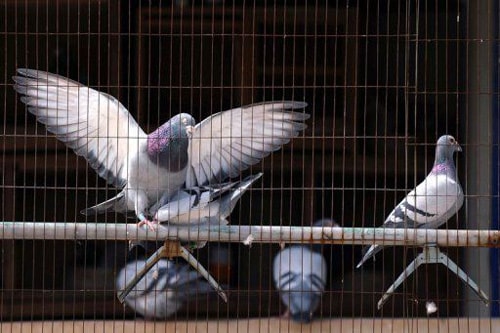24 deaths from H7N9 flu virus in China
New flu cases are still being reported sporadically in many areas of China.
The H7N9 flu epidemic continues to develop complicatedly in China. As of the afternoon of April 29, one more patient died from H7N9 flu virus infection in Shanghai. New flu cases are still being recorded sporadically in many areas of China. Chinese health authorities continue their efforts to prevent the spread of flu and guide people on measures to prevent the flu virus.
 |
Taiwanese and Chinese authorities have ordered people to stop coming into close contact with pigeons (Photo: AFP) |
Health officials in Shanghai, China, one of the areas with the highest number of H7N9 cases in the country, confirmed the death of a patient on April 29. The 89-year-old patient died after 12 days in the hospital, bringing the total number of deaths from H7N9 in Shanghai to 13.
Thus, as of April 29, the number of deaths due to H7N9 flu virus in China was determined to be 24 people.
No new cases of influenza were reported in Shanghai on April 29. To date, the city has had 33 confirmed cases of influenza, of which 11 have been cured and discharged from hospital.
In Shandong province, on the same day, another patient infected with H7N9 flu died. This patient is the first case of flu infection in Shandong. A day before, this patient's 4-year-old son was also hospitalized with flu symptoms.
In the central province of Ha Nam, another patient was discharged from the hospital after treatment. This is the third recovery case in the province, although the previous patient was hospitalized in critical condition.
Chinese health officials are working closely with international experts to monitor and research the H7N9 strain. Health experts advise people to thoroughly cook poultry before eating it. At a recent meeting, the World Organization for Animal Health (OIE) assessed the Chinese government's efforts in dealing with the flu as effective. Keith Hamilton, an expert from the World Organization for Animal Health, said: "There is no evidence that eating poultry or poultry eggs will cause people to get influenza. Poultry meat and eggs are safe and should be cooked thoroughly at meals."
In Taiwan, China, the only area outside mainland China with H7N9 flu patients is also stepping up measures to prevent the spread of the disease. Taiwan's Agriculture Ministry said on April 29 that it would step up disinfection and sanitation work at a riverside park with many pigeons in Taipei City. Taiwanese authorities also ordered people not to approach or feed the pigeons. Those who violate the ban will be fined up to $200. Taipei Mayor Eric Chu said: "We have warned people about the flu and announced a ban on close contact with pigeons. This ban is necessary. People need to understand the situation and protect their health at this time."
Taiwan's Agriculture Department also said it will closely monitor poultry shops and trading areas in the area to detect the H7N9 virus early if any./.
According to VOV - DT






